名词性从句精讲精练
名词性从句精讲精练

名词性从句精讲精练一、教学内容寒假专题:名词性从句精讲精练名词往往在句中充当主语,宾语,表语和同位语。
在复合句中,代替名词充当主语,宾语,表语和同位语的句子统称为名词性从句。
名词性从句分为:主语从句、宾语从句、表语从句、同位语从句。
(一)引导名词性从句的连接词引导名词性从句的连接词可分为五类:a.连词:that(无任何词意,不作成分,只起连接作用,宾语从句中常可省略)1) My hope is that she will soon be well again. (表语从句)我的希望是她能很快康复。
2) Everybody hopes that she will soon be well again.(宾语从句)大家都希望她能很快康复。
3) That she will soon be well again is our hope.(主语从句)她能很快康复是我们的希望。
b. whether, if(均表示“是否”表明从句内容的不确定性,不作成分)1) Whether he is coming or not doesn’t matter too much.(主语从句,不能用if)2) I went in and asked if/whether they had a cheap suit.3) I wonder whether/if he will come in such bad weather.c. 连接代词:what, whatever, which, whichever, (在从句中作主语,宾语,表语,指物)1) ____he need is more time.显然,主语从句:he是主语,谓语动词need缺宾语,因此应填what.2) Tell us ___you saw and heard during your visit to that university.3) This is not ___I want.4) ____some people are against is ___other people are for.5) The question is which team will win.6) I have two apples, I don’t know which you want.归纳:what一般用于不知道内容或范围的句子;which“哪一个……”一般用于给出内容或范围的句子。
高考英语语法专题精讲精练-名词性从句

语法专题二:名词性从句1. 名词性从句的基本概念:1) 主语从句:在句中充当主语;亦可用it作形式主语,主语从句置于句末。
2) 宾语从句:在句中充当及物动词或介词的宾语;亦可用it作形式宾语,宾语从句置于句末。
3) 表语从句:在句中充当系动词的表语。
4) 同位语从句:常置于fact, idea, news, promise, doubt, suggestion, possibility, belief等表示有内容的名词后,起解释、说明作用。
2. 注意:1) 名词性从句要用陈述句语序。
2) 名词性从句中缺少主语、表语、宾语时:常用what 导,亦可用which表示选择,用who/whom/whoever指人。
缺少状语:用where(表地点), when(表时间), how(表方式), why(表原因)。
3) 如不缺成份:主语从句、同位语从句用that引导,不能省略;表从、单个动词宾从可省略引导词that;介词宾从、第二个宾从,引导词that一般不省略;it作形式主语或宾语时,引导实际主从或宾从,一般that不省略;当主从、宾从本身为复合句时,引导词that不省略。
如:He told us sadly that what he had done secretly was dis covered by his parents.4) 含宾从的复合句中,主句和从句的时态保持一致,但如果从句中表示是客观现象,虽然主句是过去时态,从句仍用一般现在时。
5) 主语从句做主语,谓语动词用单数;如果由and 连接两个或两个以上的主语从句做主语时,谓语动词用复数;由两个或多个连接词引导一个主语从句,谓语动词用单数。
6) 当主句是I/We think(或suppose, expect, believe, imagine, guess)时,其后的宾语从句如果是否定的,常常把否定词not从从句中移到主句中。
7) 只能用whether,不能用if表示“是否”的情况如下:(1) 在表语从句和同位语从句中;(2) 在主语从句中,如果用it做形式主语,whether和if都能引导主语从句,否则,只能用whether(3) 在介词之后;(4) 后面直接跟动词不定式;(5) 与or not连用;(6) 引导让步状语从句,只能用whether。
高考英语名词性从句经典讲解
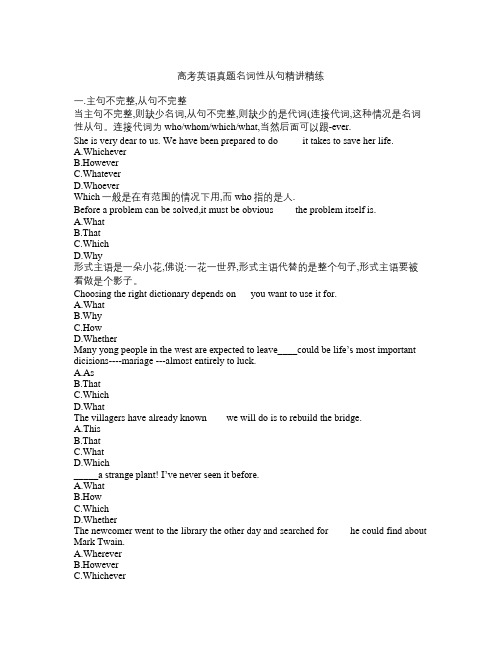
高考英语真题名词性从句精讲精练一.主句不完整,从句不完整当主句不完整,则缺少名词,从句不完整,则缺少的是代词(连接代词,这种情况是名词性从句。
连接代词为who/whom/which/what,当然后面可以跟-ever.She is very dear to us. We have been prepared to do_____it takes to save her life.A.WhicheverB.HoweverC.WhateverD.WhoeverWhich一般是在有范围的情况下用,而who指的是人.Before a problem can be solved,it must be obvious ____the problem itself is.A.WhatB.ThatC.WhichD.Why形式主语是一朵小花,佛说:一花一世界,形式主语代替的是整个句子,形式主语要被看做是个影子。
Choosing the right dictionary depends on___you want to use it for.A.WhatB.WhyC.HowD.WhetherMany yong people in the west are expected to leave____could be life’s most important dicisions----mariage ---almost entirely to luck.A.AsB.ThatC.WhichD.WhatThe villagers have already known____we will do is to rebuild the bridge.A.ThisB.ThatC.WhatD.Which_____a strange plant! I’ve never seen it before.A.WhatB.HowC.WhichD.WhetherThe newcomer went to the library the other day and searched for ____he could find about Mark Twain.A.WhereverB.HoweverC.WhicheverD.Whatever____matters most in learning English is enough practice.A.WhatB.WhyC.WhereD.Which____parents say and do has a life-long effect on their children.A.ThatB.WhichC.WhatD.AsI’d like to start my own business -----that’s ___I’d do if I had the money.A.whyB.WhenC.WhichD.What二.主句不完整,从句完整主句不完整,说明缺名词,还是名词性从句,从句完整,要填连词(that/if/whether和连接副词(when/where/why/howCindy shut the door heavily and burst into tears. No one in the officeknew___she was so angry.A.WhereB.WhyC.WhetherD.That---I prefer shutting myself in and listening to music all day on Sunday. --That’s ___ I don’t agree. You should have a more active life.A.WhereB.HowC.WhenD.What----It is no use having ideas only----Don’t worry. Peter will show you___ to turn an idea into an act.A.HowB.WhoC.WhatD.WhereTwenty students want to attend a class that aims to teach___ to read fast.A.WhatB.WhoC.HowD.Why--Have you finished the book?--No,I have read up to____the children discover the secret cave.A.WhichB.WhatC.ThatD. Where当连词和连接副词都通顺的时候,选择连接副词,表达更加充分。
名词性从句学案精讲精练习题附答案
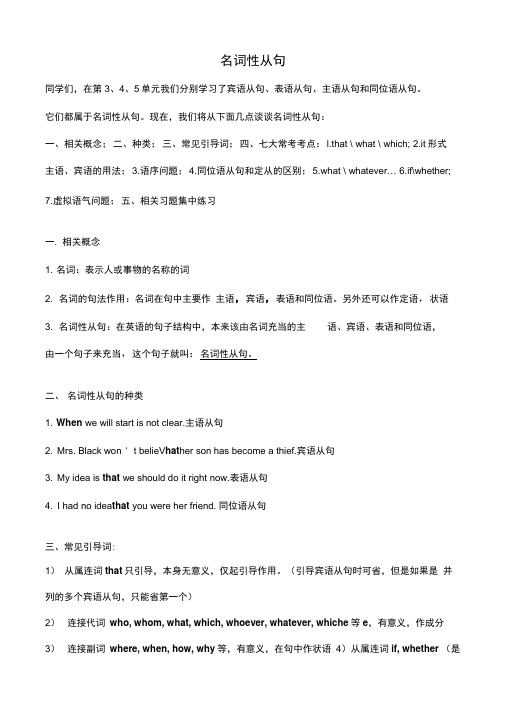
名词性从句同学们,在第3、4、5单元我们分别学习了宾语从句、表语从句、主语从句和同位语从句。
它们都属于名词性从句。
现在,我们将从下面几点谈谈名词性从句:一、相关概念;二、种类;三、常见引导词;四、七大常考考点:l.that \ what \ which; 2.it形式主语、宾语的用法;3.语序问题;4.同位语从句和定从的区别;5.what \ whatever… 6.if\whether;7.虚拟语气问题;五、相关习题集中练习一.相关概念1. 名词:表示人或事物的名称的词2. 名词的句法作用:名词在句中主要作主语,宾语,表语和同位语。
另外还可以作定语,状语3. 名词性从句:在英语的句子结构中,本来该由名词充当的主语、宾语、表语和同位语,由一个句子来充当,这个句子就叫:名词性从句。
二、名词性从句的种类1. When we will start is not clear.主语从句2. Mrs. Black won ' t belieV hat her son has become a thief.宾语从句3. My idea is that we should do it right now.表语从句4. I had no idea that you were her friend. 同位语从句三、常见引导词:1)从属连词that只引导,本身无意义,仅起引导作用。
(引导宾语从句时可省,但是如果是并列的多个宾语从句,只能省第一个)2)连接代词who, whom, what, which, whoever, whatever, whiche等e,有意义,作成分3)连接副词where, when, how, why等,有意义,在句中作状语4)从属连词if, whether (是否)(if只能引导动词、形容词之后的宾语从句)1. What he said has nothing to do with you.2. When we'start tomorrow will be told soon.3. That he did such a thin gsatisfied me.4. How we can protect cultural relics needs to be discussed.四、名词性从句七大常考考点考点1:A.连接词:that与what的区别What we can ' t get seems better tha h n at we have.That a new teacher will come to our school is true.that只起连接作用,无意义,在从句中不充当任何成分;what既有连接作用,又要在从句中作成分(主语,宾语,表语)(…的东西;物;话;时间;地点;人物擞目等不同概念)1. After five hours drive, they rea Wtedt was called the hometow n of the goddess.2. The other day, my brother drove his car down the street at what was a dangerous speed.3. The village was quite differe nt from what it used to be.4. That the earth is round is known to us all.5. Father made a promis&hat if I passed the exam in ati on he would buy me a computer.B. what (什么)/ which (表选择,哪一个)1. ---Do you know what Mr. Black ' s addres? is---He may live at No. 18 or No. 19 of Bridge Street. I whi o h not sure of2. I read about it in some books or other, does it mattewhich it was?咼考题选萃1) ____ y ou don ' t like him is none of my bus in ess.A. WhatB. WhoC. ThatD. Whether2) ___ h e said at the meeti ng ast oni shed everybody prese nt.A. WhatB. ThatC. The factD. The matter3) There ' s a feeling in me ___ we kn'w weve ra UFO is.A. thatB. whichC. of whichD. what考点2 : it作形式主语,形式宾语的用法A. it作形式主语1. 他犯了那样一个错误真是遗憾。
名词性从句精讲精练1-3
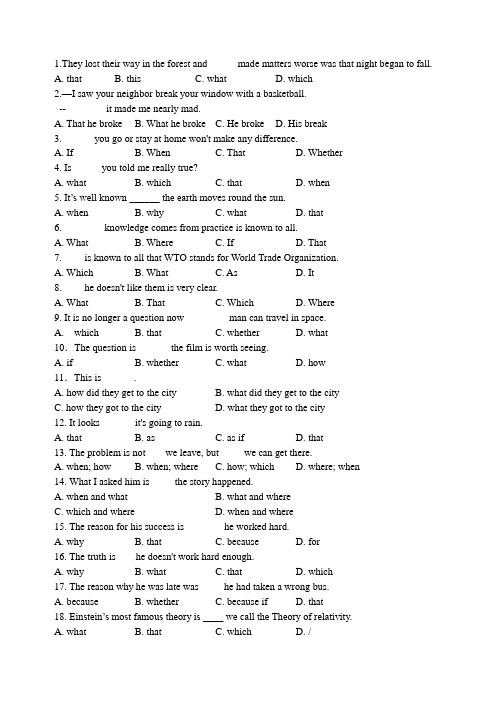
1.They lost their way in the forest and _____ made matters worse was that night began to fall.A. thatB. thisC. whatD. which2.—I saw your neighbor break your window with a basketball.-- _______ it made me nearly mad.A. That he brokeB. What he brokeC. He brokeD. His break3.______ you go or stay at home won't make any difference.A. IfB. WhenC. ThatD. Whether4. Is _____ you told me really true?A. whatB. whichC. thatD. when5. It’s well known ______ the ear th moves round the sun.A. whenB. whyC. whatD. that6.________ knowledge comes from practice is known to all.A. WhatB. WhereC. IfD. That7.____ is known to all that WTO stands for World Trade Organization.A. WhichB. WhatC. AsD. It8. ____he doesn't like them is very clear.A. WhatB. ThatC. WhichD. Where9. It is no longer a question now ________ man can travel in space.A. whichB. thatC. whetherD. what10.The question is ______ the film is worth seeing.A. ifB. whetherC. whatD. how11.This is ______.A. how did they get to the cityB. what did they get to the cityC. how they got to the cityD. what they got to the city12. It looks ______ it's going to rain.A. thatB. asC. as ifD. that13. The problem is not ___ we leave, but ____ we can get there.A. when; howB. when; whereC. how; whichD. where; when14. What I asked him is ____ the story happened.A. when and whatB. what and whereC. which and whereD. when and where15. The reason for his success is _______ he worked hard.A. whyB. thatC. becauseD. for16. The truth is ___ he doesn't work hard enough.A. whyB. whatC. thatD. which17. The reason why he was late was ____ he had taken a wrong bus.A. becauseB. whetherC. because ifD. that18. Einstein’s most famous theory is ____ we call the Theory of relativity.A. whatB. thatC. whichD. /19. To tell you the truth, this is _____ in the world.A. which I haveB. that I haveC. what I haveD. whether I have20. Part of the reason Charles Dickens loved his own novel , David Copperfield, was _______ it was rather closely ________ it was rather closely modeled on his own life.A. whatB. thatC. whyD. whether21. This museum is not ______ it was ten years ago.A. thatB. whenC. whichD. what22.—Are you still thinking about yesterday’s game? —Oh,that’s ____.A. what makes me feel excitedB. whatever I feel excited aboutC. how I feel about itD. when I feel excited23.The mountain is no longer ________it used to be.A. whichB. thatC. asD. what24. Do you doubt ________ I believe you?A. thatB. whichC. whetherD. if25. I know nothing about the accident but ________ a car ran over a small boy.A. howB. thatC. whenD. why26. Nobody but Jim and his uncle _____.A. know who is heB. know who he isC. knows who is heD. knows who he is27. I didn't know what _____.A. was the matterB. is the matterC. matter wasD. the matter is28. We have plenty of books here. You may take _____ you like .A. in whichB. from whichC. whicheverD. that29. It depends on ______ we have enough time.A. ifB. weatherC. if or notD. whether30. – How do you like the address Hu Jintao delivered at the Asian APEC in 2009?-- Great. I take ______ that he spoke of the physical security measures.A. allB. itC. oneD. this31. I want to buy some stamps. Can you tell me _____ near here?A. if there's a post officeB. is there a post officeC. where is the post officeD. whether is there a post office32. What we have seen is different from _______.A. we heardB. we have heardC. what we heardD. what we have heard33. I couldn't agree with _____ at the meeting.A. that you saidB. which you saidC. all what you saidD. what you said34. He was lucky enough to sell his car for exactly ______.A. where he had paid for itB. what he had paid for itC. what he was paid for itD. which he had paid for it35. We are asked ___ we think the likely result of an action will be.A. thatB. whatC. whichD. whether36. We know little about the young lady except ________you told me.A. whatB. thatC. howD.不填37. I know nothing about her except ________she is from Canada.A. howB. whenC. thatD. why38. We were all very worried over the fact _____ you were ill.A. thatB. whatC. whichD. about which39. The news ____ Lincoln was murdered filled the Ameri can people’s hearts with deep sorrow.A. whichB. whenC. thatD. how40. You have no idea_______ for her safety.A. how anxious I have beenB. so anxious I have beenC. how I have been anxiousD. I have been so anxious41. Word came ________ Fei Junlong had succeeded in walking in space.A. thatB. whyC. whereD.who42.The fact________ she works hard is well known to us all.A. thatB. whatC. whyD. which。
高考英语语法名词性从句高频考点精讲与精练
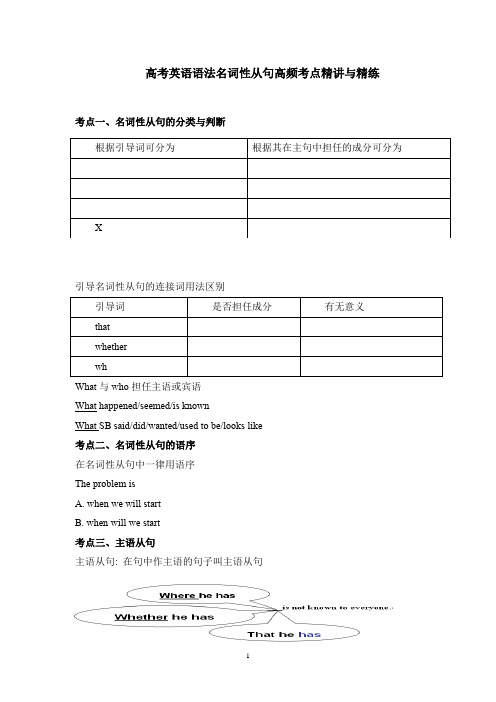
高考英语语法名词性从句高频考点精讲与精练考点一、名词性从句的分类与判断引导名词性从句的连接词用法区别 引导词是否担任成分 有无意义 thatwhetherwhWhat 与who 担任主语或宾语What happened/seemed/is knownWhat SB said/did/wanted/used to be/looks like考点二、名词性从句的语序在名词性从句中一律用语序The problem isA. when we will startB. when will we start考点三、主语从句主语从句: 在句中作主语的句子叫主语从句根据引导词可分为根据其在主句中担任的成分可分为X(一)主语从句的复合句主谓一致一般情况下单个的主语从句作主语,谓语动词用; 两个或以上的主语从句作主语,谓语动词用。
如:When he was born_______(be) not clear.When the person was murdered and why he was murdered_______ (be) still unknown.Who laughs last_______ (laugh) best.(二)主语从句五种句型(1) It is necessary/surprising/positive/certain/clear/obvious/evident/apparent/likely/probable/p ossible that sb do(2) It is a pity/a shame/an honour/a fact/a surprise/ a wonder/no wonder/ a coincidence/one’s responsibility/duty that sb do(3) It is said/known/believed/expected that sb do(4) It happens/comes about/occurs to sb/strikes sb/hits sb/turns out/worries sb a lot /seems/matters that sb do (It doesn't matter whether sb do)(5) What is known is that sb do考点四、宾语从句在复合句中用作宾语的从句叫宾语从句介词后的从句也叫宾语从句He was interested inyou told him.(一)that引导的宾语从句改错:She told me that she lived in Beijing and she was an actress .(二)用whether或if引导的宾语从句①I don’t know whether or not he will help us.②I don’t care whether you have money.③I wonder whether sb do④He asked whether sb do⑤I am not sure whether sb do(三)宾语从句中的时态呼应主句是一般现在时,从句.①I know that he (study) English every day.②I know that he (study) English last term.③I know (that) he (study) English next year.④We know that he (study) English since 1998.主句用一般过去时,从句①We believed that he (earn) enough money to build a house.②The teacher told us that he (leave) us for America.当从句表示的是客观真理,科学原理,自然现象,则从句③The teacher told us that the sun(rise)in the east.(四)否定转移:I/ We think (suppose, expect, believe, guess, imagine) that sb not…变为I/ We don’t think that sb do sth判断改错:①We believe that he won’t win the game.判断改错:②He thinks he won’t do so.(五)it做形式宾语1、句型为"6123结构"2、like it/dislike it /hate it that sb doI’d appreciate it if sb dosee to it/rely/depend on it/take it for granted that sb dokeep it in mind that sb do (不能用it)(六)doubt后的宾语从句I doubt whether… I am not sure whether…I don’t doubt that…I am sure that…Do you doubt that… Are you sure that…例句:①We doubt he can win the game.②I don’t doubthe will win the game.(七)suggest/order宾语从句suggest that sb should do建议suggest that sb do/did/will do说明,以为着,认为①He suggested that a meeting_______ (hold) immediately.②The smile on his face suggested that he_______ (pass) the examination. insist that sb should do坚持要求insist that sb do/did/will do坚持认为①I insist that she _______ (do) her work alone②He insisted that he_______ (be) right.考点五、表语从句:表语从句:在句中作表语的句子叫表语从句。
名词性从句精讲精练
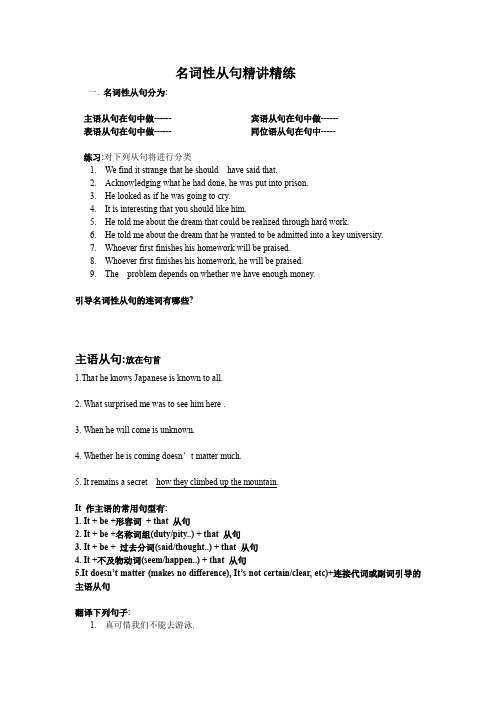
名词性从句精讲精练一. 名词性从句分为:主语从句在句中做------ 宾语从句在句中做------表语从句在句中做------ 同位语从句在句中-----练习:对下列从句将进行分类1.We find it strange that he should have said that.2.Acknowledging what he had done, he was put into prison.3.He looked as if he was going to cry.4.It is interesting that you should like him.5.He told me about the dream that could be realized through hard work.6.He told me about the dream that he wanted to be admitted into a key university.7.Whoever first finishes his homework will be praised.8.Whoever first finishes his homework, he will be praised.9.The problem depends on whether we have enough money.引导名词性从句的连词有哪些?主语从句:放在句首1.That he knows Japanese is known to all.2. What surprised me was to see him here .3. When he will come is unknown.4. Whether he is coming doesn’t matter much.5. It remains a secret how they climbed up the mountain.It 作主语的常用句型有:1. It + be +形容词+ that 从句2. It + be +名称词组(duty/pity..) + that 从句3. It + be + 过去分词(said/thought..) + that 从句4. It +不及物动词(seem/happen..) + that 从句5.It doesn’t matter (makes no difference), It’s not certain/clear, etc)+连接代词或副词引导的主语从句翻译下列句子:1.真可惜我们不能去游泳.2.碰巧那天我外出了.3.他考试肯定会考好.4.据说他已告诉了她一切.用形式主语it 的主语从句常见结构1.It is clear (necessary, important, possible,remarkable that… 很清楚(必要, 重要,可能, 值得注意等)…2.It is a fact (a good thing, good news…)that … 事实是( 好事是,好消息是…)…3.It is well-known ( reported, recorded, estimated,said, believed)that…众所周知( 据报道,,据记载,据说,据估计)…4.It turns out ( seems, happens, appea rs…)that… 结果是( 似乎是, 碰巧是, 好象是…)…5.It has been found (has been proved,can be seen,must be pointed out)that …已发现( 已证明,可以看出,需指出)…用it 句型翻译:1.据说今年高一学生要学新教材.2.事实是他们靠自己完成了所有的任务.3. 碰巧他们已经参加过军训了.4.众所周知, 比尔·盖茨是世界上最富有的人.5.我们应该养成好的学习习惯这很重要.※在主语从句中用来表示惊奇、不相信、惋惜、理应如此等,谓语动词用虚拟语气“(should) +do”,常用的句型有:(1)It is necessary (important, natural, strange, etc.) that...(2)It is a pity(a shame, no wonder, etc.) that...(3)It is suggested (requested, proposed, desired, etc.) that...如: It is strange that she (should) think so.表语从句: 放在系动词之后1. The truth is that he has never been to the countryside.2. The question is whether w can finish the experiment by Friday.3. It looks as if it were going to rain.又比如:She talks as if /as though she had been there before .4. This school is no longer what it was before.注意下列表语从句中where, how, why 的译法1.This is where Lu Xun once lived.2.That was how they won the match.3.This is why she got up so early thismorning. 固定句型:This is where…This is why …Th is is how….1.我们就是这样克服困难的.2.那就是他昨天缺席的原因.3.这就是我们上星期碰头的地方.宾语从句一、宾语从句的定义在句子中期宾语作用的从句叫做宾语从句。
高中名词性从句复习精讲及练习.doc
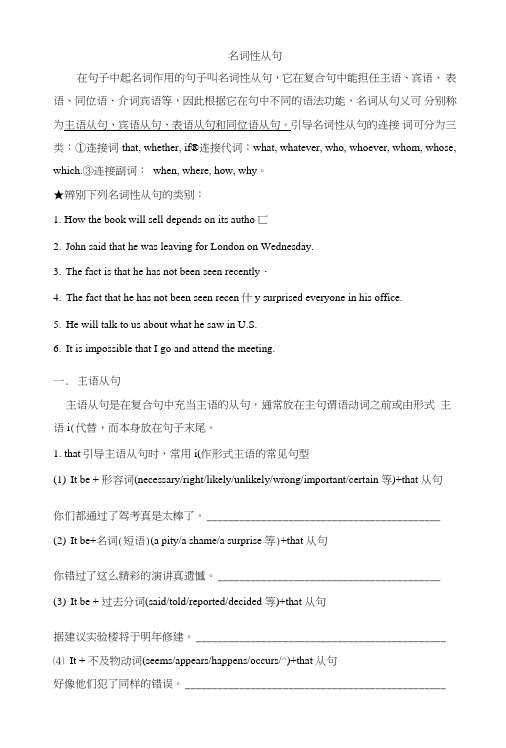
名词性从句在句子中起名词作用的句子叫名词性从句,它在复合句中能担任主语、宾语、表语、同位语、介词宾语等,因此根据它在句中不同的语法功能,名词从句乂可分别称为主语从句、宾语从句、表语从句和同位语从句。
引导名词性从句的连接词可分为三类:①连接词that, whether, if®连接代词:what, whatever, who, whoever, whom, whose, which.③连接副词:when, where, how, why。
★辨别下列名词性从句的类别:1.How the book will sell depends on its autho匸2.John said that he was leaving for London on Wednesday.3.The fact is that he has not been seen recently・4.The fact that he has not been seen recen什y surprised everyone in his office.5.He will talk to us about what he saw in U.S.6.It is impossible that I go and attend the meeting.一.主语从句主语从句是在复合句中充当主语的从句,通常放在主句谓语动词之前或由形式主语i(代替,而本身放在句子末尾。
1.that引导主语从句时,常用i(作形式主语的常见句型(1)It be + 形容词(necessary/right/likely/unlikely/wrong/important/certain 等)+that 从句你们都通过了驾考真是太棒了。
___________________________________________ (2)It be+名词(短语)(a pity/a shame/a surprise 等)+that 从句你错过了这么精彩的演讲真遗憾。
名词性从句精讲精练

名词性从句精讲精练名词性从句相当于名词,可分别作主句的主语、表语、宾语和同位语。
因此,名词性从句厅分为主语从句、表语从句、宾语从句和同位从句。
(一)引导名词性从句的连接词1、连接代词:who, whose, whom, what, which o有词义,在从句中担任成分,如主语、表语、宾语、或定语等。
2、连接副词:whe n, where, why, how o有词义,在从句中担任成分,作状语。
3、连接词:that, whether, if, as if othat无词义,在从句中不担任成分,有时可省略;if (whether), as if虽有词义,但在从句中不担任成分。
注意:连接代词与连接副词在句中不再是疑问句,因而从句中谓语不用疑问式。
连接代词与连接副词在从句充当句子成分,连接词whether和if (是否),as if (好象)在从句中不充当句子成分,只起连接作用。
根据句义,如果连接代词与连接副词,whether、if和as if都用不上时,才用that作连接词(that本身无任何含义)。
(二)主语从句1、主语从句在复合句作主语。
e.g. Who will go is not imp orta nt.2、用it作形式主语,主语从句放在句末。
e.g. It does n't matter so much whether you will come or not.3、that引导主语从句时,不能省略。
e.g. That he sudde nly fell ill last week made us sur prised.(三)表语从句1、表语从句在复合句中作表语,位于系动词之后。
e.g. The questi on was who could go there.2、引导表语从句的连接词that有时可省去。
e.g. My idea is (that) we can get more comrades to he lp in the work.(四)宾语从句1、宾语从句在复合句中作宾语。
名词性从句专项精讲精练

复习名词性从句专项精讲精练诊断练习:1. A computer can only do ________ you have instructed it to do.(NMET 2001)A. howB. afterC. whatD. when2. —I drove to Zhuhai for the air show last week..—Is that _________ you had a few days off ? (NMET 99)A. whyB. whenC. whatD. where3. I hate __________ when people talk with their mouths full.(NMET 98)A. itB. thatC. theseD. them4.---Do you remember __________ he came?---Yes, I do, he came by car.A. howB. whenC. thatD. if5.Go and get your coat. It's ____ you left it.A. thereB. whereC. there whereD. where there6.It is generally considered unwise to give a child •__________ he or she wants.A. howeverB. whateverC. whicheverD. whenever7.Can you tell me __________ ?A. who is that womanB. who the woman isC. whom is the womanD. that woman is8. I don't doubt________ my friend, •John •will •come •to China soon.A. thatB. whetherC. ifD. when9. I know nothing about her but __________ she is from Canada.A. howB. whenC. thatD. why10.It depends on __________ we have enough time.A. ifB. if or notC. thatD. whether11. The reason _________ nothing on earth is motionless •is ___________ the earth is in constant motion(运动).A. why; thatB. that; whyC. of; thatD. that; because12.---•I believe _____you've done your best and _____ things will happen.----Thank you.A. That; /B./; /C. what; thatD./; that13.Please give the book to ____ wins the first prize.A. whoB. whomC. whoeverD. whomever14.A man's worth lies not so much in ______ he has as in _______ he is.A. that; whatB. what; whatC. that; thatD. what; that15.The gentleman insisted that he _______ the wallet.A. hadn’t seenB. not seeC. would not seeD. did not see基本用法:▲名词性从句的功能相当于名词,根据其在句中充当的成分可分为主语从句、宾语从句、表语从句和同位语从句。
名词性从句精讲精练

名词性从句精讲精练Grammar(1) 名词性从句在复合句中起到名词作用的从句叫名词性从句,包括主语从句,表语从句,宾语从句和同位语从句。
引导名词性从句的词有:连词that,whether,if;连接代词和连接副词what, which, who, whom, whose, when, where, why,how等。
名词性从句可以表示两方面:一个事实,一个问题。
问题又分两方面即一般问句和特殊问句,请看下图:一、主语从句就是做主语的从句。
它由that 和其他疑问词引导。
1.That they are rich is true, isn't it? (that 不能省略)2.Where he got it is unknown to us.3.They lost their way in the woods, and what made matters worse was that night began to fall.4.Whoever said that was wrong.5.______ ______ _______ ______ _______ ______ ______ (地球围绕太阳转) is a truth.6._______ _______ _______ (任何努力学习的人) will pass the exam.7.______ ____ _____ ______(我所告诉你的) just now was what had been written in the letter.8._______ ______ _________ _____ _______ _____ _____ ____( 我是接受礼物还是拒绝它)is none of your business.有时用it 作形式主语,而把真正的主语从句移到后面。
其句型有:a. It + be +形容词+ that-从句It is necessary/important that… 有必要/重要的是……It is obvious that… 很明显……b. It + be + -ed 分词+ that-从句It is believed that…人们相信……It is known to all that…从所周知……It has been decided that…已决定……c. It + be +名词+ that-从句It is common knowledge that………是常识It is a surprise that… 令人惊奇的是……It is a fact that…事实是……d. It +不及物动词+ that-分句It a ppears that…似乎……It happens that…碰巧……It occurred to me that…我突然想起……9. 他没有想到Jack能够把这道题目做出来。
【精致版】名词性从句精讲精练
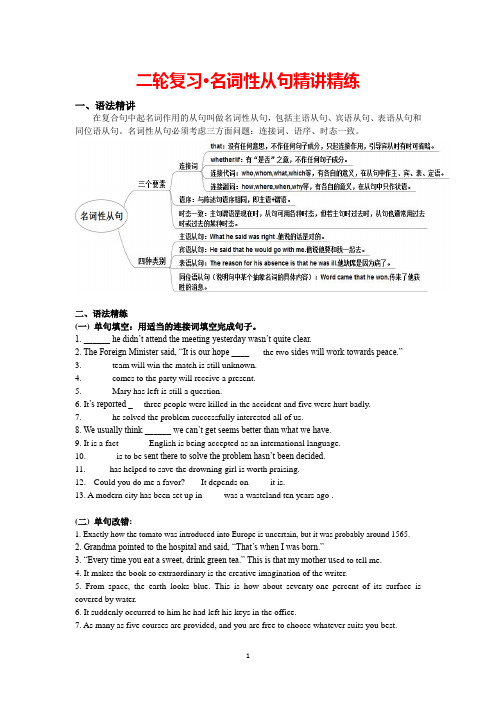
二轮复习·名词性从句精讲精练一、语法精讲在复合句中起名词作用的从句叫做名词性从句,包括主语从句、宾语从句、表语从句和同位语从句。
名词性从句必须考虑三方面问题:连接词、语序、时态一致。
二、语法精练(一) 单句填空:用适当的连接词填空完成句子。
1. ______ he didn’t attend the meeting yesterday wasn’t quite clear.2. The Foreign Minister said, “It is our hope ____-__ the two sides will work towards peace.”3. ______ team will win the match is still unknown.4. ______ comes to the party will receive a present.5. ______ Mary has left is still a question.6. It’s reported ___ three people were killed in the accident and five were hurt badly.7. ______ he solved the problem successfully interested all of us.8. We usually think ______ we can’t get seems better than what we have.9. It is a fact ______ English is being accepted as an international language.10. ______ is to be sent there to solve the problem hasn’t been decided.11. _____has helped to save the drowning girl is worth praising.12.-- Could you do me a favor? ---- It depends on ____ it is.13. A modern city has been set up in ____ was a wasteland ten years ago .(二) 单句改错:1. Exactly how the tomato was introduced into Europe is uncertain, but it was probably around 1565.2. Grandma pointed to the hospital and said, “That’s when I was born.”3. “Every time you eat a sweet, drink green tea.” This is that my mother us ed to tell me.4. It makes the book so extraordinary is the creative imagination of the writer.5. From space, the earth looks blue. This is how about seventy-one percent of its surface is covered by water.6. It suddenly occurred to him he had left his keys in the office.7. As many as five courses are provided, and you are free to choose whatever suits you best.8. It doesn’t matter if you pay by cash or credit card in this store.9. Our teachers always tell us to believe in that what we do and who we are if we want to succeed.10.When the news came how the war broke out, he decided to serve in the army.11. It all depends on if they will support us .12.Doris' success lies in the fact which she is co-operative and eager to learn from others.(三) 语法填空:I am going to tell you 1. happened in my restaurant today.This afternoon a poorly-dressed gentleman came into my restaurant. Nobody knew 2. he was. We were surprised that he finished two orders of food in a very limited time. We wondered 3. he was so hungry. We also doubted 4. the man was able to pay the bill. The gentleman asked 5. we should mind waiting for just a minutes. After some time, we were shocked to see 6. he took out of a letter and a million pound bank-note.I asked Mr. Clements, the owner of the restaurant, 7. it was genuine. Mr. Clements said it was true because two of this amount had been issued by the Bank of England this year. He thought 8. the gentleman showed them couldn’t be fake.9. a gentleman with a million pound note was in rags and ate in our small restaurant was a big puzzle to all the people there. I really couldn’t describe 10.excited I was to meet such a millionaire.(四) 名词性从句分类翻译1.what(1)他们已经尽力帮助了他的同学。
名词性从句精讲精练

名词性从句精讲精练高中英语语法解析---名词性从句在句子中起名词作用的句子叫名词性从句(Noun Clauses)。
名词性从句的功能相当于名词词组, 它在复合句中能担任主语、宾语、表语、同位语、介词宾语等,因此根据它在句中不同的语法功能,名词从句又可分别称为主语从句、宾语从句、表语从句和同位语从句。
引导名词性从句的连接词可分为三类:连接词:that, whether, if (不充当从句的任何成分)连接代词:what, whatever, who, whoever, whom, whose, which.连接副词:when, where, how, why, as if名词性从句主要测试点1. 引导词的选择:名词性从句中引导词的选择要遵循的原则是:成份+语意; 特别注意区分that和what;if和whether;no matter what和whatever等2. 时态:无特殊要求,但除宾语从句要遵循时态一致的原则,即主句是过去的时态从句一定要用过去的时态,客观真理除外。
3. 语序:一律用陈述语序(不用疑问语序)4. 语意一致:如主句表否定或疑问语气,则从句要用wh-疑问词引导,不能用that5. 引导词的省略:除宾语从句中that可以省略之外,均不可省略6. 名词性从句中的虚拟语气: (should)+ do一.主语从句主语从句是在复合句中充当主语的从句,通常放在主句谓语动词之前或由形式主语it代替,而本身放在句子末尾。
1.Who will win the match is still unknown.2.Where the meeting will be held has not been announced.3.What he experienced does not happen to everyone.4.What he wants to do is to find a quiet place to study.5.That the earth is round is known to us all.6.That we should learn English well is very important.7.Whatever I have will be yours in the future.8.Whoever comes late should apologize.9.Why he has gone abroad is not clear.10.Which book he will choose doesn’t matter.11.How he became rich remains a mystery.12.Whether we will put on a play is still under discussion.It 作形式主语代替主语从句,主要是为了平衡句子结构,主语从句的连接词没有变化。
名词性从句精讲精练
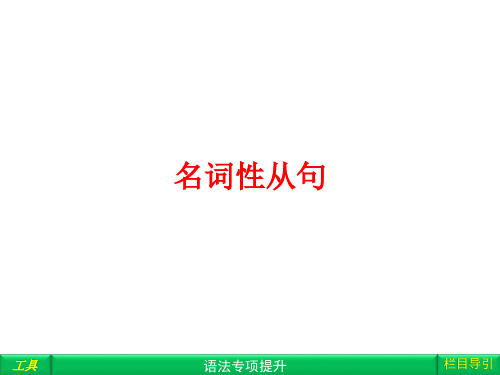
工具
语法专项提升
栏目导引
2.同位语从句与定语从句的区别: 同位语从句是对前面名词的内容作进一步的解释、说 明,引导词只起引导作用,不在句中作任何成分,一般不可 省略。定语从句是对前面名词进行修饰、限制,引导词在句 中作一定的句子成分。
工具
语法专项提升
栏目导引
The news that they had won the game soon spread over the whole school.他们赢得比赛的消息很快就传遍了整个学校。(此 句为同位语从句,进一步解释“the news”的内容)
12.We came to a place _t_h_a_t_/_w_h__ic_h__they had never visited before.
工具
语法专项提升
栏目导引
这位可怜的年轻人无论什么样的帮助都乐意接受。
工具
语法专项提升
栏目导引
What troubles her is that she can’t buy whatever she wants with the money she earns.
困扰她的是她不能用她挣的钱买任何她想要的东西。 To improve the quality of our products , we asked for suggestions whoever had used the products. 为提高产品的质量,我们向用过此产品的人征求建议。 Whatever/No matter what you say,I will not believe you. 无论你说什么,我不会相信你。
名词性从句
工具
语法专项提升
栏目导引
主语从句在主句中作主语,位于主句谓语动词之前,但 多数情况下由it作形式主语,而把真正的主语放在句子的后 面,其句型结构为:
名词性从句精讲精练

关联词的选定方法
1.I am satisfied with (what _______ you said.) what 2.I don’t know(________ the place used to be.) 3.I know(who/whom __________ you want to talk to .) 4.There are many books. Can you tell me which ( ____ book you like best. ) who 5.You can show me( ________ is your monitor .) 6.You can tell me(whose ________ book it is. ) whoever 7.you can give the book to( ______ wins first place.)
Pay attention
特别注意的问题
Subjunctive mood in Noun Clauses
1. It +be+adj+that… necessary,clear,important,strange, 等 It’s necessary that you (should) master the computer. It’s important that a student (should) learn English well. It’s strange that he (should) have killed himself.
2. It +be + noun+that… a pity, a shame, a suggestion, advice, order, demand,wish should+do--现在 should have done--过去 It’s a great shame that he (should) have stolen a pen. • His suggestion is that we (should) finish the work at once. • Your advice is that we (should) do the homework first.
高考总复习之名词性从句精讲精练含习题包含答案

高考总复习之名词性从句精讲精练(含习题包含答案)【教学目标】通过课堂讲解,掌握名词性从句的重点考点。
【教学重点】主语从句、宾语从句、表语从句、同位语从句的重点考点。
【教学难点】灵活运用四类名词性从句。
【进门得分】l.There is a feeling in me _that we’ll never know what a UFO is.2.I think, though I could be mistaken, — he liked me.【that】3.At the meeting, we discussed we should employ more workers. [whether]4.After seemed like hours he came out with a bitter smile. [what] 【教学内容】高考英语名词性从句详解考点分析:易错点引导词what与that的区别;引导词whether和if的区别;名词性从句的语序;who / whoever, what / whatever等的区别;where, when, why等连接副词引导的名词性从句; “介词+ who (m) ”引导的宾语从句与“介词+who (m) ”引导的宾语从句的区别;名词性从句中有插入成分时;引导词that的省略;同位语从句引导词where, when的用法特点一、引导词what与that的区别引导主、宾、表语从句时,what要充当主语、宾语或表语等句子成分,that不作任何成分,而只在语法上起连接作用。
例如:we can,t get seems better than we have.A. What;whatB. What;thatC. That;thatD. That;what注意:在下面的例句中,that不充当任何成分,只起语法连接作用(因为句子本身不缺成分):1 / 20高考总复习之名词性从句精讲精练(含习题包含答案)That the former Iraq president Saddam was captured has been proved.二、引导词whether和if的区别通常,引导主语从句、表语从句和同位语从句时,连词要用whether,而不用if ;习惯上也只能说whether or not,而不说if or not .例如:the meeting will be held in Beijing is not known yet.A.WheneverB. IfC. WhetherD. That注意:如果宾语或主语从句为否定句时,只能用that,不能用whether引导。
- 1、下载文档前请自行甄别文档内容的完整性,平台不提供额外的编辑、内容补充、找答案等附加服务。
- 2、"仅部分预览"的文档,不可在线预览部分如存在完整性等问题,可反馈申请退款(可完整预览的文档不适用该条件!)。
- 3、如文档侵犯您的权益,请联系客服反馈,我们会尽快为您处理(人工客服工作时间:9:00-18:30)。
名词性从句精讲精练名词性从句相当于名词,可分别作主句的主语、表语、宾语和同位语。
因此,名词性从句厅分为主语从句、表语从句、宾语从句和同位从句。
(一)引导名词性从句的连接词1、连接代词:who, whose, whom, what, which。
有词义,在从句中担任成分,如主语、表语、宾语、或定语等。
2、连接副词:when, where, why, how。
有词义,在从句中担任成分,作状语。
3、连接词:that, whether, if, as if。
that 无词义,在从句中不担任成分,有时可省略;if (whether), as if虽有词义,但在从句中不担任成分。
注意:连接代词与连接副词在句中不再是疑问句,因而从句中谓语不用疑问式。
连接代词与连接副词在从句充当句子成分,连接词whether 和if(是否),as if(好象)在从句中不充当句子成分,只起连接作用。
根据句义,如果连接代词与连接副词,whether、if 和as if都用不上时,才用that作连接词(that本身无任何含义)。
(二)主语从句1、主语从句在复合句作主语。
e.g. Who will go is not important.2、用it作形式主语,主语从句放在句末。
e.g. It doesn't matter so much whether you will come or not.3、that引导主语从句时,不能省略。
e.g. That he suddenly fell ill last week made us surprised.(三)表语从句1、表语从句在复合句中作表语,位于系动词之后。
e.g. The question was who could go there.2、引导表语从句的连接词that有时可省去。
e.g. My idea is (that) we can get more comrades to help in the work.(四)宾语从句1、宾语从句在复合句中作宾语。
引导宾语从句的连词that一般可省略。
e.g. I hope (that) everything is all right.2、介词之后的宾语从句,不可用which或if连接,要分别用what或whether。
e.g. I'm interested in whether you've finished the work..I'm interested in what you've said.3、whether与if都可以引导宾语从句,常可互换。
但下面情况不能互换。
①宾语从句是否定句时,只用if,不用whether。
e.g. I wonder if it doesn't rain.②用if 会引起误解,就要用whether。
e.g. Please let me know whether you want to go.(此句如果把whether改成if,容易当成条件句理解)③宾语从句中的whether 与or not直接连用,就不能换成if;不直接连用,可换。
e.g. I don't know whether or not the report is true.I don't know whether/ if the report is true or not.④介词后的宾语从句要用whether引导。
whether 可与不定式连用。
whether也可引导主语从句、表语从句、同位语从句,还可引导让步状语从句,以上均不能换成if。
但引导条件从句时,只能用if,而不能用whether。
e.g. It depends on whether we have enough time.They don't know whether to go there.Please come to see me if you have time.(五)同位语从句同位语从句在句中作某一名词的同位语,一般位于该名词(如:news, fact, idea, suggestion, promise等)之后,说明该名词的具体内容。
e.g. I have no idea when he will be back.The fact that he had not said anything surprised everybody.练习:名词性从句一、判断下列各句哪句含有名词性从句,并指出是什么从句:1. China is no longer what it used to be.2. The truth that the earth turn around the sun is known to all.3. It was snowing when he arrived at the station.4. How he persuaded the manager to change the plan is interesting to us all.5. The news that they had won the game soon spread over the whole school.6. The news that you told me yesterday was really disappointing.7. That is where Lu Xun used to live.8. He spoke as if he understood what he was talking about.9. Do you remember the teacher who taught us English at middle school?10. I wonder why she refused my invitation.二、用适当的连词填空:1. I can't decide ____________ dictionary I should buy.2. That's ____________ he refused my invitation.3. I am very interested in ____________ he has improved his pronunciation in such a short time.4. ____________ we need is more time.5. The fact ____________ she had not said anything at the meeting surprised everybody.6. ____________ and ____________ they will meet has not been decided yet.7. Please tell me ____________ you are waiting for.8. Is that ____________ you are looking for?9. Would you please tell me ____________ the nearest post office is?10. I don't know ____________ he will agree to the plan or not.三、选择填空:1. Do you see _____ I mean?A. thatB./C. howD. what2. Tell me_____ is on your mind.A. thatB. whatC. whichD. why3. We must stick to _____ we have agreed on.A. whatB. thatC. /D. how4. Let me see _____.A. that can I repair the radioB. whether -I can repair the radioC. I can repair the radioD. whether can I repair the radio5. Keep in mind _____.A. that the teacher saidB. what did the teacher sayC. that did the teacher sayD. what the teacher said6. Could you advise me _____?A. which book should I read firstB. what book should I read firstC. that book 1 should read firstD. which book I should read first7. He was criticized for _____.A. he had done itB. what he had doneC. what had he doneD. that he had done it8. Would you kindly tell me _____?A. how can I get to the Beijing Railway StationB. how I can get to the Beijing Railway StationC. where can I get to the Beijing Railway StationD. whether can I get to the Beijing Railway Station9. Mrs. Smith was very much impressed by _____.A. what had she seen in ChinaB. that she had seen in ChinaC. what she had seen in ChinaD. which had she seen in China10. We took it for granted ___A. that they were not comingB. that were they not comingC. they were coming notD. were they not coining11. I really don't know _____A. I should do nextB. what should I do nextC. what I should do nextD. how I should do next12. I'm afraid _____.A. the little girl will have to be operated onB. that will the little girl have to operate onC. the little girl will have to operate onD. that will the little girl have to be operated on13. She walked up to _____ .A. where did I standB. where I stoodC. I stood thereD. where I stood there14. Can you tell me _____?A. who is that gentlemanB. that gentleman is whoC. who that gentleman isD. whom .is that gentleman15. We'll give you _____.A. that do you needB. what do you needC. whatever you needD. whether do you need16. They want us to know _____ to help us.A. what can theyB. what they canC. how they canD. how can they17. We must put _____ into practice.A. what we have learnedB. that we have learnedC. that have we learnedD. what have we learned18. Did she say anything about _____?A. that the work was to be doneB. how was the work to be doneC. that was the work to be doneD. how the work was to be done19. He was never satisfied with _____.A. what she had achievedB. had what she achievedC. she had achievedD. that she achieved20. These photographs will show you _____.A. what does our village look likeB. what our village looks likeC. how does our village look likeD. how our village looks like21. Peter insisted _____ he pay the bill.A. on thatB. whatC. thatD. on which22. They urged _____ the library open during the vacation.A. whenB. whereC. whyD. that23. We wish we could have learned _____ when we were at high school.A. what you didB. that you had doneC. that what you didD. what did you do24.1 will describe to you _____ I saw when there.A. whatB. thatC. whichD./25. From _____ I should say he is a good worker.A. what 1 know of himB. that I do know of himC. what do I know of himD. that do I know of him26. I will give this dictionary to __ wants to have it.A. whomeverB. anyoneC. whoeverD. someone27._____ they will come here hasn' t been decided yet.A. WhatB. ThatC. WhenD. Where28. _____ was said here must be kept secret.A. WhoB. The thingC. WhateverD. Where29. It is still a question _____ we shall have our sports meet.A. ifB. thatC. whatD. when30. I'm going anyway. _____ she will go is up to her to decide.A. If or notB. Whether or notC. IfD. That31. It is strange _____ she have left without saying a word.A. thatB. whatC. whyD. how32. It is very clear _____ our policy is a correct one.A. whatB. thatC. whyD. where33. _____ Mr Zhang said is quite right.A. ThatB. WhenC. WhatD. Whether34. It has been decided _____ he will be sent there.A. ifB. whetherC. whyD. that35. It doesn' t matter _____he' s come back or not.A. ifB. whetherC. thatD. when36. It's a great pity _____ we won't be able to finish the task on time.A. whenB. thatC. whyD. where37. It happened _____ I wasn't there that day.A. whenB. whyC. whereD. that38._____ you have done might do harm to other people.A. WhatB. ThatC. WhichD. The things39. _____ leaves the room last ought to turn oft the lights.A. AnyoneB. The personC. WhoeverD.Who40._____ the 2000 Olympic Games won't be held in Beijing is known to all.A. WhetherB. IfC. WheneverD. That41. _____ fails to see this will make a big mistake.A. ThatB. WhoeverC. WhetherD. Whether or not42. __ we need more equipment is quite obvious.A. WhatB. WhetherC. ThatD. Whatever43. Has it been announced _____?A. when are the planes to take offB. that are the planes to take offC. where are the planes to take offD. when the planes are to take off44. That is _____ we all support his idea.A. whatB. whyC. whereD. when45. That's _____ we should do.A. thatB. whatC. howD. why46. _____ is troubling me is _____ I don't understand _____ he saidA. What; that; whatB. What; what; whatC. That; that; whatD. Why; that; which47. Things were not _____ they seemed to be.A. whenB. whyC. thatD. what48. That's _____ I want to say.A. all whatB. whatC. all whichD. what that49. That's _____ .A. where our differences lieB. our differences lie thereC. where do our differences lieD. that where our differences lie50. That is _____ .A. where lived he thereB. where did he liveC. where he livedD. that where he lived51. The questions is _____.A. whether is it worth doingB. that if it is worth doingC. whether it is worth doingD. if it is worth doing52. Water will continue to be _____ it is today next in importance to oxygen.A. howB. whichC. whatD. as53. That's_____.A. how did I become a teacherB. how I became a teacherC. how a teacher I becameD. that I became a teacher54. They are just _____.A. that what shall I haveB. what shall I haveC. that I shall have whatD. what I shall have55. It looked ____.A. as if it was going to rainB. that as if it was going to rainC. as if was it going to rainD. as if that it was going to rain56. That's_____.A. how she did itB. that how did she do it.C. how did she do itD. what she did it57. That is _____ we decided to put the discussion off.A. whereB. whichC. thatD. why58. That's _____ I lived when I was ten years old.A. whereB. at whichC. there whereD. when59. My suggestion is _____ we should send a few comrades to help them.A. ifB. thatC. when thatD. that where60. The idea _____ all people are selfish is wrong.A. whatB. thatC. whyD. if61. We heard the news _____ our team had won.A. thatB. whatC. whetherD. why62. The fact _____ he hadn't said anything surprised us all.A. whyB. ifC. thatD. whether63.I have no idea _____ she will be back.A. thatB. whereC. that whenD. when64. We must keep in mind the fact _____ China is still a developing country.A. whetherB. thatC. whyD. when65. They have no idea at all _____.A. where he has goneB. where did he goC. where has he goneD. which place he has gone语法复习三:名词性从句一、1、表语从句;2、同位语从句;3、不是;4、主语从句;5、同位语从句;6、不是;7、表语从句;8、宾语从句;9、不是;10、宾语从句二、1. which; 2. why; 3. how; 4. What; 5. that; 6. when, where; 7. who(m); 8. what; 9. where; 10. whether三、1~5 DBABD 6~10 DBBCA 11~15 CABCC 16~20 BADAB 21~25 CDAAA26~30 CCCDB 31~35 ABCDB 36~40 BDACD 41~45 BCDBB 46~50 ADBAC51~55 CCBDA 56~60 ADABB 61~65 ACDBA。
